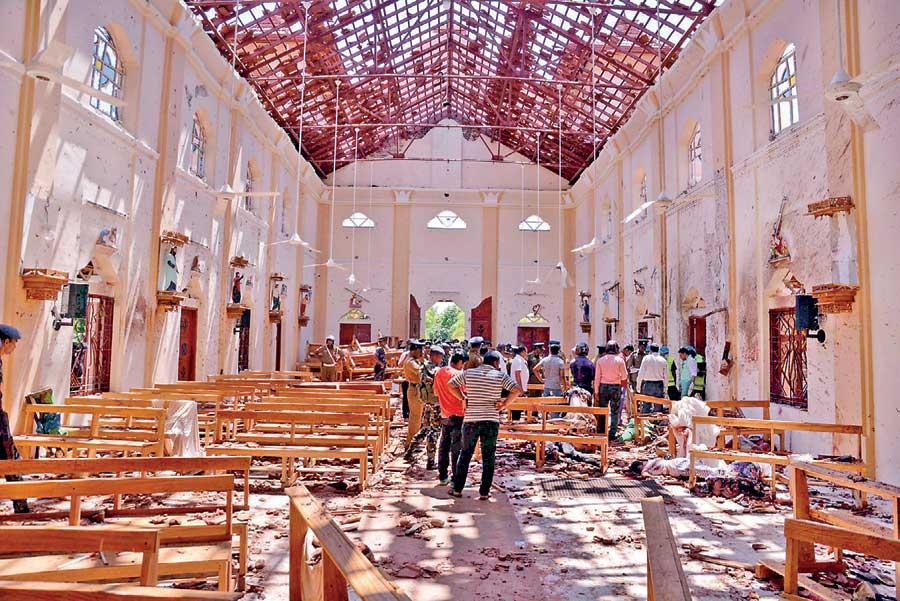Reply To:
Name - Reply Comment

In the aftermath of the September 11 attacks the US invented a term that has stuck on since and will stick on for as long as chaos reigns in the Middle East: the “War on Terror”. Those who were with Uncle Sam were part of the “Coalition of the Willing” and those who were not were part of the “Axis of Evil”, never mind that no one really questioned the right of one country to come up with these terms and divide the world along their lines. In any case the War turned out to be a re-enactment of the Crusades, and a continuation of a conflict the Cold War had concealed for eight decades. 
Samuel Huntington wrote on the possibility of such a conflict arising again, and he is considered today as the foremost expert on the subject, but he wasn’t the first one. At a time when it was more or less taken for granted that the Soviet Union needed to be pushed back, if not pushed down, US Senator Daniel P. Moynihan, in an editorial in the New York Times published on December 21, 1986, clearly and concisely attacked what was referred to as the “Reagan Doctrine”, which envisaged a policy of rollback (i.e. full military confrontation if necessary) with the Soviets. It was, as the editorial termed it, a “contentious doctrine” which, taken to its logical extreme, would replace ideological conflict (singular) with ethno-religious conflicts (plural).
The problem with the Cold War was that it propped up a form of ethnic nationalism that was hardly inclusive or accommodative. On neither side of the divide were there forces which were sympathetic or alert to rising ethnic and secessionist sentiments. In Mirsaid Sultan-Galiev, for instance, the Soviet Union had its chance at reconciling the aspirations of the Islamic community with the ideology of the Party. And yet, he was put down, jailed, released, jailed again, and during the Stalinist years, executed. With that the Soviets permanently alienated their Muslims.
"To dispel such a belief requires more than the usual campaigns on sanhindiyawa in our schools, universities, and offices"
This does not mean that Western governments were more receptive to these ethnic aspirations. Their actions led to the deposal of democratically elected leaders in favour of unelected, fanatical, and erratic cranks: Ayub Khan for Iskander Mirza in Pakistan; a line of satraps of the Shah for Mosaddegh in Iran; Suharto for Sukarno in Indonesia; and Zia Ul-Haq for Bhutto in Pakistan. If these leaders did not encourage fanaticism, they created by their ineffectiveness an oppositional space that did: the Shah’s lack of sympathy for Shias, for instance, led to the rise of Ayatollah Khomeini.
This is hardly the only reason why extreme Islamism arose, and it doesn’t seem to be the main one either. Like all forms of ethno-religious-cultural extremism its ascent can be attributed to both internal and external causes; it is by understanding these causes, and giving them their due weight, that we can think of understanding the ISIS menace and build up a defence policy and discourse around it. Until then, all other points will remain peripheral to the main debate.
The problem, however, is that Sri Lankans are battling Islamism in pretty much the same way Bush’s War on Terror did: by tackling the cosmetics of the issue. In other words, we are being distracted by things which shouldn’t distract us.
I’m not talking merely of mob attacks on Muslim shops, houses, and mosques. These have been disproportionate and they have compelled disgust. Nor am I talking about the anger of the people against Rishad Bathiudeen and Azath Salley, even though their anger is justified. I am talking instead of our inability – Buddhists, Christians, Hindus, basically non-Muslims – to  rationalise the opposition to Islamic extremism in terms of a criterion or an agenda that does not smack of Islamophobia.
rationalise the opposition to Islamic extremism in terms of a criterion or an agenda that does not smack of Islamophobia.
Let me be clear here. Halal is not the issue. The burqa is not the issue. They are issues that encompass wide, general questions about the nature of citizenry in a secular State, and the role of the State in implementing one law for all, and so on. They certainly do have a bearing on the immediate priority – clamping down on extremist Islamism. But they have, at best, a cursory bearing. No one linked halal or the veil with Wahhabism, although there may be connections between the three. Even if there are, we are taking the wrong road to combating it.
An effective onslaught on Islamism (extremist Islam) requires a two-pronged approach. On the one hand, national security has to be given top priority, which means that the armed forces and defence establishment have to be, for better or worse, given carte blanche within the confines of constitutional limits. This is not a very popular option, and commentators are predicting the resurgence of a defence discourse which may well trump other considerations, but to those who are raising such concerns the ideal response would be what that most radical-liberal of Western politicians, Pierre Trudeau, said when a reporter asked about the ramifications of heightening security in Canada: “It is more important to keep law and order in this society than to be worried about weak-kneed people who don’t like the looks of a helmet.”
"Terrorism does not fall from the sky – it is born from and bred by forces which have interpreted a faith in the most fundamental, purist way possible – but we shouldn’t take this as an excuse to admonish every member of a community"
That’s just one side to it though. The other point, which also requires top priority, is a laborious, comprehensive discourse on Islamism and Islam (the one extremist, the other a product of history). It is important at the outset to divide the one from the other, because if there’s a fallacy almost every Sri Lankan is subscribing to right now, it’s the generalisation that all Muslims are complicit in what transpired in April. To dispel such a belief requires more than the usual campaigns on sanhindiyawa in our schools, universities, and offices: it requires a meticulously planned, organised, and implemented programme in which myth is separated from history, lie from truth, so that the whole country – Muslim and non-Muslim – become aware of the intricacies that distinguish extremists from non-extremists.
The urgency of such a programme cannot be overstated. There’s a reason for that: more than any other community, the Muslims of the country, and the world, have faced opprobrium from the non-Muslim communities for what is (wrongly) felt to be their involvement in the rise of fanaticism. Terrorism does not fall from the sky – it is born from and bred by forces which have interpreted a faith in the most fundamental, purist way possible – but we shouldn’t take this as an excuse to admonish every member of a community. To do so would be to consider all Sinhala Buddhists as BBS supporters, or all Tamils as LTTE supporters.
The Muslim community has been the hardest hit, globally, from the onslaughts of Western imperialism – yesterday, today, and tomorrow. The Middle-East is the most ravaged place in the world (second to Africa), and the attacks there have mostly been on Muslims. It’s not a coincidence that these attacks have been made by the West – the US and Russia; the Palestinian death toll from the 2014 Israel-Gaza conflict alone, to give just one statistic, stands at 2,251.
"The Muslim community has been the hardest hit, globally, from the onslaughts of Western imperialism – yesterday, today, and tomorrow"
The tragedy is that it just didn’t have to be this way. But it is how it stands, might is right, and surviving victims, naturally, are getting more and more hardened with each drone strike. You do not have to read Noam Chomsky to understand this.
We cannot do anything about this. But there’s something we can do.
The history of Islam is richer than anything that Islamophobic commentators – whether here, in India, or in the US and Europe – can come up with. It remains one of the biggest ironies that while Western physicians were banned from dissecting bodies due to injunctions set down by the Church, the likes of Averroes and Avicenna – the two most brilliant minds to emerge from the Islamic world at the time – were writing down exhaustive treatises on medicine, translating Aristotle, and coming up with the number system, “including the all-important zero.”
In the awful though at times meaningless civilisational battle between Christianity and Islam, it was the latter that bestowed on the world a spirit of rationality and scepticism that the West would take three more centuries to imbibe. “Al-Farabi did not believe in the immortality of the soul. Avicenna did: but he did not believe in the resurrection of the body,” the great historian Fernand Braudel once noted, arguing that Islam created quite possibly “the most brilliant civilisation in the Old World.”
We need to revisit the history of that civilisation, or else we very likely will turn out to be participants in a conflict devoid of meaning, reason, and humanity. That history should be taught in our schools, but our schools are not the only place where it needs to be taught. Let me put that in another way: we need to read more. And empathise. Otherwise, we are doomed to exacerbate an already tense situation.